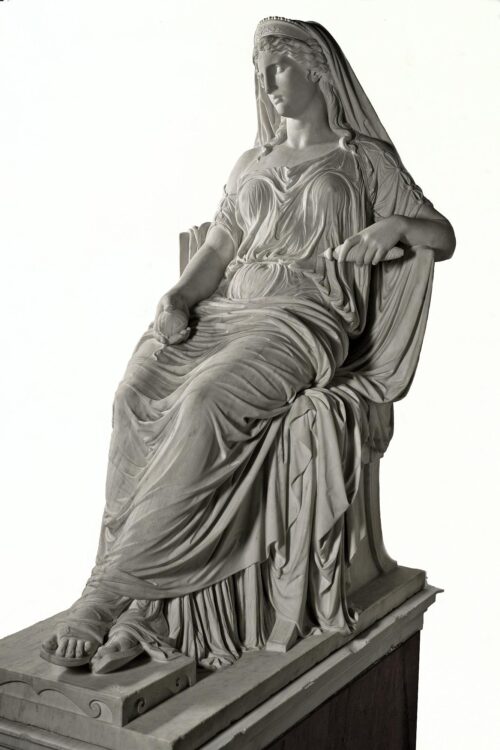| Περιγραφή τεκμηρίου: |
Leonidas Drossis belonged to the first generation of modern Greek sculptors who studied at the Athens School of Arts and were shaped in the spirit of neoclassicism that was brought to Greece by the German sculptor Christian Siegel. Broadening his education at the Munich Academy under Max Widnmann and with trips to Paris, London, Dresden, Vienna and Rome, where he opened a workshop, he would prove to be the most important representative of Greek neoclassicism.Penelope emanates from Drossis' cycle of mythological themes. The final model was done in Rome, in all likelihood in 1867, since that very same year it was presented at the International Exhibition of Paris where it won the gold medal. In 1870 it was exhibited at the Olympia exhibition, along with the first small model from 1864, and won the gold medal there as well. King George I allocated thirty thousand drachmas to transfer it to marble and after it was completed it was placed on the golden stairway of the Royal Palace.Seated on an elaborately ornamented throne, Penelope is seen holding the ball of thread and the spindle, her crossed legs stretched out before her, resting on a decorated stool. Her pose is influenced by the ancient Greek Pheidian model of "Aphrodite", a tradition that was carried on in "Agrippina" from the 4th century AD in the Capitoline Museum in Rome and the mother of Napoleon, "Letizia Ramolino Bonaparte" (1804-1807) by Antonio Canova.Both the pose of the body and the head, which is bent slightly to the left, and the melancholic expression on the face reveal the fatigue and the sense of abandonment in addition to the fortitude of this woman who had to wait for her husband to return for so many years. Thus, the work is connected with the romantic aspect of the European neoclassicism, which emphasizes the feeling against the logic and portrays personal psychological states. Furthermore, despite the neoclassicistic characteristics, the depiction of these human emotions differentiates "Penelope" from the ancient models.
|
